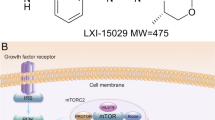Summary
Background This is the first phase I, dose-finding study of AZD8055, a first-in-class dual mTORC1/2 inhibitor, in Japanese patients with advanced solid tumors. Patients and methods Patients received a single oral dose of AZD8055, followed by twice-daily (BID) dosing. The starting dose was 10 mg with dose escalations in subsequent cohorts to a maximum of 90 mg BID or a non-tolerated dose. Results Seventeen patients were dosed: 10 mg (n = 3), 40 mg (n = 4), 60 mg (n = 3), 90 mg (n = 7). In the 90 mg cohort, one dose limiting toxicity (n = 1) of increased aspartate aminotransferase and increased alanine aminotransferase was observed in the 90 mg BID cohort (n = 1). Four patients, all in the 90 mg BID cohort, experienced a serious adverse event considered to be related to AZD8055: increased alanine aminotransferase (n = 3), increased aspartate aminotransferase (n = 3), increased gamma-glutamyltransferase (n = 2). The 90 mg BID dose was considered as tolerated in Japanese patients but higher doses were not investigated as this dose was also the maximum tolerated dose in Western patients. AZD8055 was rapidly absorbed with greater-than-proportional increases in exposure with increasing dose. No responses were reported, but two patients had stable disease. Mean pAKT and p4EBP1 levels decreased in most cohorts. Conclusion The tolerability and pharmacokinetic profiles of AZD8055 in Japanese patients were similar to those reported in Western patients.


Similar content being viewed by others
References
Guertin DA, Sabatini DM (2007) Defining the role of mTOR in cancer. Cancer Cell 12:9–22
Jefferies HB, Fumagalli S, Dennis PB, Reinhard C, Pearson RB, Thomas G (1997) Rapamycin suppresses 5′TOP mRNA translation through inhibition of p70s6k. EMBO J 16:3693–3704
Manning BD, Cantley LC (2007) AKT/PKB signaling: navigating downstream. Cell 129:1261–1274
Vivanco I, Sawyers CL (2002) The phosphatidylinositol 3-Kinase AKT pathway in human cancer. Nat Rev Cancer 2:489–501
Vilar E, Perez-Garcia J, Tabernero J (2011) Pushing the envelope in the mTOR pathway: the second generation of inhibitors. Mol Cancer Ther 10:395–403
(2011) Europeans Medicines Agency; Temsirolimus Summary of Product Characteristics
(2012) Europeans Medicines Agency; Everolimus Summary of Product Characteristics
Carew JS, Kelly KR, Nawrocki ST (2011) Mechanisms of mTOR inhibitor resistance in cancer therapy. Target Oncol 6:17–27
Chresta CM, Davies BR, Hickson I, Harding T, Cosulich S, Critchlow SE, Vincent JP, Ellston R, Jones D, Sini P, James D, Howard Z, Dudley P, Hughes G, Smith L, Maguire S, Hummersone M, Malagu K, Menear K, Jenkins R, Jacobsen M, Smith GC, Guichard S, Pass M (2010) AZD8055 is a potent, selective, and orally bioavailable ATP-competitive mammalian target of rapamycin kinase inhibitor with in vitro and in vivo antitumor activity. Cancer Res 70:288–298
Sini P, James D, Chresta C, Guichard S (2010) Simultaneous inhibition of mTORC1 and mTORC2 by mTOR kinase inhibitor AZD8055 induces autophagy and cell death in cancer cells. Autophagy 6
Naing A, Aghajanian C, Raymond E, Kurzrock R, Blanco M, Oelmann E, Grinsted L, Burke W, Kaye S, Banerji U (2011) Abstract A168: first results from a phase I trial of AZD8055, a dual mTORC1 and mTORC2 inhibitor. Mol Cancer Ther 10:A168
Phan VH, Moore MM, McLachlan AJ, Piquette-Miller M, Xu H, Clarke SJ (2009) Ethnic differences in drug metabolism and toxicity from chemotherapy. Expert Opin Drug Metab Toxicol 5:243–257
Benjamin D, Colombi M, Moroni C, Hall MN (2011) Rapamycin passes the torch: a new generation of mTOR inhibitors. Nat Rev Drug Discov 10:868–880
Nakashima K, Narukawa M, Takeuchi M (2011) Approaches to Japanese dose evaluation in global drug development: factors that generate different dosages between Japan and the United States. Clin Pharmacol Ther 90:836–843
Yamamoto N, Horiike A, Fujisaka Y, Murakami H, Shimoyama T, Yamada Y, Tamura T (2008) Phase I dose-finding and pharmacokinetic study of the oral epidermal growth factor receptor tyrosine kinase inhibitor Ro50-8231 (erlotinib) in Japanese patients with solid tumors. Cancer Chemother Pharmacol 61:489–496
Yamamoto N, Nokihara H, Yamada Y, Goto Y, Tanioka M, Shibata T, Yamada K, Asahina H, Kawata T, Shi X, Tamura T (2012) A phase I, dose-finding and pharmacokinetic study of olaparib (AZD2281) in Japanese patients with advanced solid tumors. Cancer Sci 103:504–509
Banerji U, Dean EJ, Gonzalez M, Greystoke AP, Basu B, Krebs M, Puglisi M, Grinsted L, Oelmann E, Burke W, Harrington E, Green S, Ranson M (2012) Abstract 3004: first-in-human phase I trial of the dual mTORC1 and mTORC2 inhibitor AZD2014 in solid tumors. J Clin Oncol 30:Abstract 3004
Acknowledgments
The study was funded by AstraZeneca. Medical writing services were provided by Tom Westgate and Emma Burke of iMed Comms and were funded by AstraZeneca.
Conflicts of interest
Hitoshi Shimada and Xiaojin Shi both are AZ employees and hold stocks. All other authors declare they have no conflicts of interest.
Financial support
The work was supported by AstraZeneca.
Author information
Authors and Affiliations
Corresponding author
Additional information
Clinical Trials ID: NCT00973076
Rights and permissions
About this article
Cite this article
Asahina, H., Nokihara, H., Yamamoto, N. et al. Safety and tolerability of AZD8055 in Japanese patients with advanced solid tumors; a dose-finding phase I study. Invest New Drugs 31, 677–684 (2013). https://doi.org/10.1007/s10637-012-9860-4
Received:
Accepted:
Published:
Issue Date:
DOI: https://doi.org/10.1007/s10637-012-9860-4




